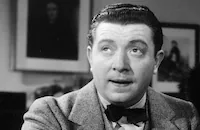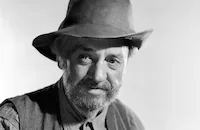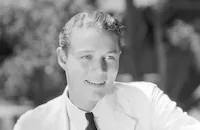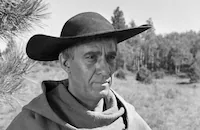Crosby's priest is newly arrived at St. Dominic's, a church that is heavily in debt and under the control of crusty, old-fashioned Father Fitzgibbon (Fitzgerald), who disapproves at first of the newcomer's breezy style. But Father O'Malley eventually proves himself a winner, performing all kinds of life-saving deeds including organizing the local street toughs into an angelic choir and arranging a fund-raising tour for them that foils a mortgage holder's plans for foreclosure.
Going My Way also provides Crosby with the opportunity to croon "Too-Ra-Loo-Ra-Loo-Ral," "The Day After Forever," "Silent Night," the title tune and, with costar Rise Stevens, "Ave Maria." He would reprise the role of Father O'Malley in a sequel, The Bells of St. Mary's (1945), which proved equally successful and won him another Oscar nomination.
On March 15, 1945, the day of the Oscar ceremonies when Going My Way was correctly predicted to sweep the major awards, Crosby was on the golf course. Casually dressed and without his toupee, he had no plans to attend the festivities and was tracked down only a couple of hours before they were to begin. Only a telephone call from his mother, who threatened he'd never hear the end of it from her if he refused to go, persuaded Crosby to attend. Quickly putting on a suit, but forgetting his hairpiece, he hurried to Grauman's Chinese Theatre.
When Crosby came to the podium to receive his award from Gary Cooper, he said, "Oh, my heavens," prompting Cooper to respond, "That's the best word I can think of at the moment for Going My Way." Crosby then added, "I couldn't be more surprised if I won the Kentucky Derby." As he completed his acceptance speech, his good friend and frequent costar Bob Hope, who was emceeing the event, slipped onstage and began making faces behind Crosby's back. Audience laughter continued after Crosby made his exit and Hope cracked that this Oscar win was like hearing that Samuel Goldwyn (the producer known for fracturing the English language) was lecturing at Oxford.
Producer/Director: Leo McCarey
Screenplay: Frank Butler, Frank Cavett, Leo McCarey (story)
Art Direction: Hans Dreier, William Flannery
Cinematography: Lionel Lindon
Costume Design: Edith Head
Editing: LeRoy Stone
Original Music: Robert Emmett Dolan, Jimmy Van Heusen
Cast: Bing Crosby (Father Chuck O'Malley), Barry Fitzgerald (Father Fitzgibbon), Rise Stevens (Genevieve Linden), Frank McHugh (Father Timothy O'Dowd), Gene Lockhart (Ted Haines, Sr.), William Frawley (Max).
BW-127m. Closed Captioning.
by Roger Fristoe








































